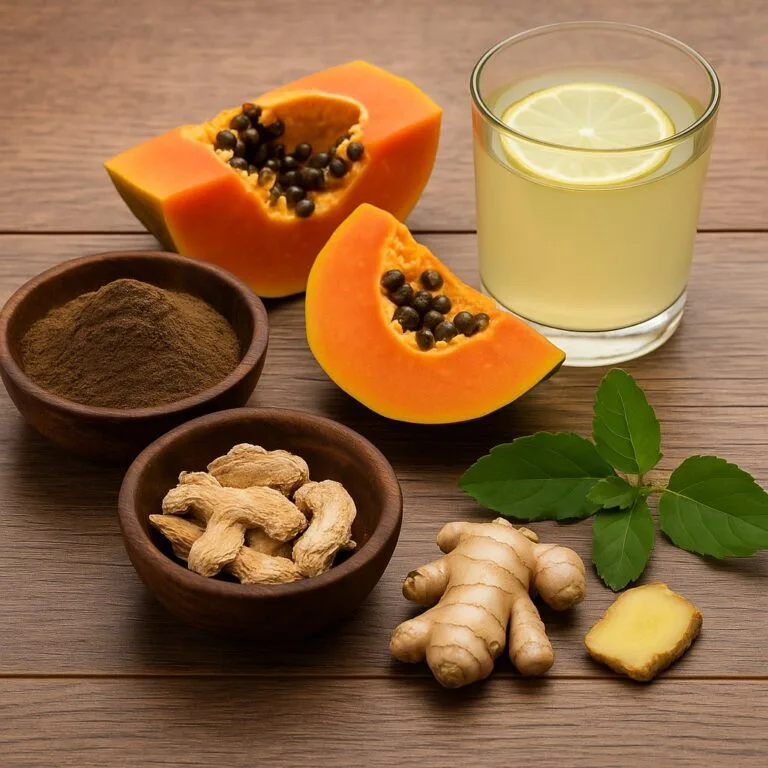Natural Ayurvedic Treatment for Appendicitis
What is Appendicitis?
Appendicitis is a medical condition characterized by the inflammation of the appendix — a small, tube-shaped pouch attached to the large intestine. If untreated, it may lead to rupture and cause a life-threatening infection of the abdominal cavity (peritonitis).
While surgical removal (appendectomy) is often necessary in acute cases, natural and Ayurvedic methods may help manage mild symptoms or aid in post-recovery care under professional guidance.
🧠 Appendix: Definition and Function
The appendix, though often labeled as a vestigial organ, is believed in Ayurveda to aid in the immune system and gut flora regulation. When it becomes blocked or infected, it leads to appendicitis.
🔍 Common Symptoms of Appendicitis
Recognizing early signs of appendicitis can prevent complications. Symptoms usually start with dull pain near the navel, eventually localizing in the lower right abdomen.
⚠️ Major Signs to Watch For:
- Sharp pain in the lower right abdominal region
- Tenderness and swelling in the abdomen
- Loss of appetite despite hunger
- Nausea and vomiting
- Low-grade fever
- Constipation or inability to pass gas
- Pain after meals, leading to fear of eating
🧾 Primary Causes of Appendicitis
Appendicitis often arises from poor digestion and lifestyle factors that promote toxic buildup (Ama) in the body:
- Sedentary lifestyle and lack of exercise
- Long indoor hours, reduced sunlight exposure
- Overeating and improper food combinations
- Chronic constipation and digestive weakness
- Low intake of fiber-rich natural foods
🧘♂️ Natural and Ayurvedic Management of Appendicitis
⚠️ Important: The remedies listed below are for mild symptoms or recovery care. Severe or acute appendicitis requires immediate medical attention.
✅ Recommended Yoga Āsanas and Mudrās
Gentle yoga postures that enhance gut health and relieve abdominal pressure:
- Pavanamuktasana (Wind-Relieving Pose)
- Ardha Matsyendrasana (Half Spinal Twist) – done gently
- Apāna Mudrā – aids digestion and bowel regulation
🚫 Avoid deep twisting poses or intense abdominal stretches during an active flare-up.
🥗 Appendicitis Diet Plan for Natural Healing
❌ Foods to Avoid:
- All non-vegetarian foods (meat, fish, eggs)
- Atapa rice (highly polished white rice)
- Fried, oily, spicy, and heavily processed foods
- Dairy products like paneer, cream, and cheese
- Constipation-causing foods: refined flour, excessive sweets, too much tea
✅ Foods to Include:
- High-fiber vegetables: bottle gourd, spinach, carrots
- Fruits with mild laxative effect: papaya, banana, figs
- Whole grains: brown rice, millets, oats
- Natural drinks: lemon water, coconut water, buttermilk
- Herbal teas: fennel, ginger, or peppermint
🌿 Additional Natural Tips for Appendicitis Care
- Drink lukewarm water throughout the day
- Practice intermittent fasting or eat small, frequent meals
- Apply castor oil packs to the abdomen (only under expert supervision)
- Take Triphala churna at night to promote bowel movement
- Avoid lying down immediately after meals
- Drink aloe vera juice on an empty stomach to reduce inflammation
🛑 Critical Precautions for Appendicitis
- Never ignore sharp abdominal pain – it could be a sign of a ruptured appendix
- Avoid self-medication or over-the-counter painkillers without consulting a doctor
- Do not attempt herbal remedies during acute flare-ups without guidance
✅ Final Thoughts: Combining Ayurveda with Medical Care
While acute appendicitis is a medical emergency, Ayurveda offers effective tools for supportive care and digestive health. A balanced lifestyle, Sattvic diet, and gentle yogic practices can enhance recovery and prevent recurrence.
Always consult with a qualified Ayurvedic practitioner or medical professional before starting any home remedies for appendicitis.
“If you often suffer from burning sensation or indigestion, explore our guide on Ayurvedic Treatment for Acidity.”
“Chronic stomach pain may indicate an ulcer. Learn about safe Ayurvedic Treatment for Gastric Ulcers in our detailed article.”
Frequently Asked Questions of Appendicitis patients:-
Q1.What causes appendicitis according to Ayurveda?
Ans: Ayurveda explains appendicitis as a result of aggravated Vata and Pitta doshas, leading to inflammation, obstruction of the digestive tract, and accumulation of toxins (Ama) in the appendix region.
Q2. Can Ayurveda cure appendicitis without surgery?
Ans: In the early stages, Ayurvedic treatment may help manage pain, reduce inflammation, and improve digestion using herbs and detox therapies. However, in severe or emergency cases, surgery may be necessary. Ayurveda is supportive for recovery and prevention.
Q3. Which Ayurvedic herbs are useful for appendicitis?
Ans: Herbs like Triphala, Guggulu, Haritaki, Punarnava, and Kutki are often used to detoxify the digestive tract, reduce inflammation, and balance Vata-Pitta doshas.
Q4. What diet is recommended in Ayurveda for appendicitis?
Ans: Ayurveda recommends a light and easily digestible diet such as khichdi, boiled vegetables, soups, and herbal teas. Foods that are spicy, fried, oily, or processed should be avoided to reduce irritation.
Q5. How can Ayurveda help in preventing appendicitis?
Ans: Ayurveda suggests maintaining good digestion, eating on time, avoiding junk and heavy foods, practicing yoga, and using detox therapies like Panchakarma to keep the digestive system healthy and prevent inflammation.
Trusted External Resources
For more information on Ayurveda, yoga, and natural wellness, explore these authoritative resources:
